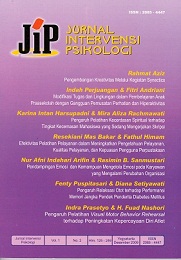Main Article Content
Abstract
Ttiis experiment examined the influence of spiritual intelligence training on student college anxiety that enrolls undergraduate studies. The hypothesis was that there is a significant anxiety level difference between experimental and control group.
The subjects of this experiment were Student College with age ranging from 22 26 years old. The design of this experiment was Pretest Posttest with Control Group Design. A measure of student anxiety was developed by using aspects from Nevid (2003). The training module was developed on the basis of Emmons Theory (Hendrawati, 2004).
Data were analyzed using gain score method. The result show that there is an anxiety level difference between experimental and control group ff =- 3,732. p = 0,003, p<0,05). 77ms means that the spiritual intelligence training show influence in decreasing student anxiety. An experiment group data analysis show that there is an anxiety difference prior and after the training (t=-16.819; p<0.01). The result of this experiment confirmed the hypothesis.
Keyword: spiritual intelligence training, anxiety
Article Details
Authors who publish with this journal agree to the following terms:
- Authors retain copyright and grant the journal right of first publication with the work simultaneously licensed under a Creative Commons Attribution-ShareAlike 4.0 International License that allows others to share the work with an acknowledgment of the work's authorship and initial publication in this journal.
- Authors are able to enter into separate, additional contractual arrangements for the non-exclusive distribution of the journal's published version of the work (e.g., post it to an institutional repository or publish it in a book), with an acknowledgment of its initial publication in this journal.
- Authors are permitted and encouraged to post their work online (e.g., in institutional repositories or on their website) prior to and during the submission process, as it can lead to productive exchanges, as well as earlier and greater citation of published work (See The Effect of Open Access).




